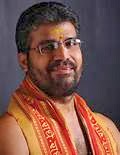The Vision of Life - 1.1. Swami Krishnananda,
------------------------------------------------------------------------------------------------------------------
Thursday, February 11, 2021. 07:23. AM.
Chapter 1: The Vision and Its Unfoldment -1.
------------------------------------------------------------------------------------------------------------------------
We have in our daily life rarely an occasion to be alone to our own selves and bestow adequate thought on the manner in which we conduct ourselves in the world, or the way in which we live at all. A spontaneous impulsion carries us through the day and the night, and all this goes under the designation of a reasoned-out procedure of a purposeful existence. But it is evident that there is not much of a rationality in this propulsion to living, whose pressure we feel every day, if only we can withdraw our minds into our own selves for a few minutes and investigate into the extent to which our daily conduct and activity are rational or reasoned procedures.
A habit that has been driven into us by the pressure of circumstances can adumbrate a light of reason in its own way, though a conscious direction is difficult to discover in its ways. Nevertheless, there is some sort of a principle that we seem to be adopting in our life, which is basically an emanation of the constitution of our own selves.
We do not apparently feel comfortable when we live a life which is contrary to what we actually are in ourselves, whether or not we have an adequate knowledge of what we ourselves are. What we are remains, however, as an irrefutable fact and persists in the affirmation of itself, though we do not in our conscious processes have an awareness of this automatic affirmation that is taking place within. The affirmation which is associated with the very existence of oneself is so basic to our nature that it does not call for any conscious consideration of it, a logical investigation into it; it does not demand a proof for its being there.
We live with a sort of prevision of what we want to achieve in the world. This vision need not necessarily be a highly sophisticated structure of intellectual deliberation. It is, again, a spontaneity that is characteristic of our nature, which is basically simple. We are a simple, indivisible element in our own selves. In our roots, we are not complicated. In common terms, we may say that we are more a kind of compound than a complex of structure involving different ingredients of composition. Our body may be composed of elements which are anatomical, physiological, but we ourselves in our essentiality are pure simplicity, which cannot be further reduced to a greater simplicity.
Inasmuch as this basic, indivisible, simple element seems to be what we really are, it spontaneously acts and reacts in respect of circumstances outside. This spontaneous reaction of our pure simplicity at the root of our being is actually the vision that we have about things, though it should not be identified with the laboured edifices of a logical structure as we have, for instance, in an engineering feat or an architectural mould.
To be continued ...
======================================================================





Comments